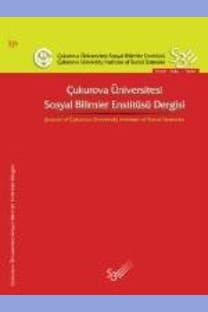FİKRİ MÜLKİYET HAKLARI ve EKONOMİK BÜYÜME ARASINDAKİ İLİŞKİ: G8 ÜLKELERİ ÜZERİNE BİR UYGULAMA
Öz
20. yüzyılın son çeyreğinde iletişim ve ulaşım ağındaki hızlı gelişmelerle oluşan ‘küreselleşme süreci’ sermayenin, mal ve hizmetlerin uluslararası bir nitelik kazanmasına neden olmuştur. Bu süreçte iletişim ve bilgi teknolojileri de çok hızlı gelişerek ‘bilgi ekonomisi’ kavramını oluşturmuştur. Bilgi ekonomisinin temelinde ise yaratıcı fikirlerin bir sonucu olan teknoloji yoğun ürünler ve AR-GE yatırımları bulunmaktadır. Günümüzde ülkeler, ekonomik büyüme sağlayabilmek için teknolojik yeniliklere ve AR-GE yatırımlarına daha çok önem vermektedirler. Bu nedenden dolayı bilgi ekonomisinde yaratıcı fikirleri koruyarak teknolojik ilerleme sağlamanın temelinde Fikrî Mülkiyet Hakları’na verilen önem yatmaktadır. Çalışmanın amacı Fikri Mülkiyet Hakları’nın G8 ülkelerinin ekonomik büyümeleri üzerindeki etkilerini ekonometrik olarak analiz etmektir. Bu çerçevede 1970-2005 dönemi Görünürde İlişkisiz Regresyon (GİR) yöntemi kullanılarak incelenmiş ve uygulama sonucunda Fikrî Mülkiyet Hakları korumasının ele alınan ülke grubu için ekonomik büyümeyi ve AR-GE yatırımlarını pozitif etkilediği sonucuna ulaşılmıştır.
Anahtar Kelimeler:
Fikrî Mülkiyet Hakları, AR-GE Yatırımları, Ekonomik Büyüme
___
- Álvarez-Rivera, 2010, Manuel, Election Resources on the Internet, http://electionresources.org, (13.08.2010). Barro, Robert & Jong-Wha Lee, 2010, A New Data Set of Educational Attainment in the World, 1950-2010, NBER Working Paper, No.15902, http://www.barrolee.com/, (24.10.2010). Braga, Carlos A. Primo, C. Fink & C. P. Sepulveda, 2000, Intellectual Property Rights and Economic Development, World Bank Discussion Paper, No.412, Washington. Dinopoulos, Elias, A. Güngöraydınoğlu & C. Syropoulos, 2005, Patent Protection and Global Schumpeterian Growth, Florida University, Globalization: Prospects and Problems, (28 – 30 January 2005), Florida. Economic Freedom of the World (2009), Annual Report, http://www.freetheworld.com, (15.08.2010). Falvey, Rod, N. Foster & D. Greenway, 2006, Intellectual Property Rights and Economic Growth, Review of Development Economics, Vol.10, No.4, p.700-719. Ferrantino, Michael J., 1993, The Effect of Intellectual Property Rights on International Trade and Investment.Weltwirtschaftliches Archiv, Vol.129, p.300-331. Fink, Carsten, 2004, Intellectual Property Rights and U.S. and German International Transactions in Manufacturing Industries, (in) Intellectual Property and Development, Ed by Carsten Fink and Keith E. Maskus, World Bank and Oxford University Press, p.75-110. Gould, David M. & W. C. Gruben, 1996, The Role of Intellectual Property Rights in Economic Growth, Journal of Development Economics, Vol.48, p.323- 350. Güvel, E.A., 2011, Ekonomik Büyüme Kuramları, Ulusların Zenginliğinin Dinamikleri, Karahan Kitabevi, Adana. Helvacıoğlu, A. Deniz, İ. H. Eraslan & M. Bulu, 2004, Dijitalleşen Dünyada Fikrî Mülkiyet Haklarının Ülkeler Açısından Küresel Rekabet Avantajı Oluşturmadaki Yeri, Ulusal Bilgi, Ekonomi ve Yönetim Kongresi, ss.485- 493, Osmangazi Üniversitesi, Eskişehir. Heston, Alan, R. Summers & B. Aten, 2009, Penn World Table Version 6.3, Center for International Comparisons of Production, Income and Prices at the University of Pennsylvania. Hu, Albert G. Z. & Ivan P. L.Png, 2009, Patent Rights and Economic Growth: Cross-Country Evidence.CELS 2009 4th Annual Conference on Empirical Legal Studies Paper, (12 November 2009), Los Angeles. Jones, Charles I., 2007, İktisadi Büyümeye Giriş (Çev. S.Ateş, İ.Tuncer), Literatür Yayıncılık, İstanbul. Kanwar, Sunil & R. Evenson, 2003, Does Intellectual Property Protection Spur Technological Change.Oxford Economic Papers, Vol.55, p.235-264. Kök, Dündar, 2007, Çokulusluluk ve Firma Performansı İlişkileri: İstanbul Menkul Kıymetler Borsası Uygulaması, Doktora Tezi. Dokuz Eylül Üniversitesi Sosyal Bilimler Enstitüsü, İzmir. Léger, Andréanne, 2005,Intellectual Property Rights in Mexico: Do They Play a Role?, World Development, Vol.33, No.11, p.1865-1879. Mankiw, Gregory, D. Romer & D. N. Weil, 1992, A Contribution to the Empirics of Economic Growth, The Quarterly Journal of Economics, Vol.107, No.2, p.407-437. OECD Factbook, 2010, Economic, Environmental and Social Statistics, http://www.oecd.org/home (20.08.2010). Parasız, İlker, 2003, Ekonomik Büyüme Teorileri, Ezgi Kitabevi, Ankara. Park, Walter G., 2005, Do Intellectual Property Rights Stimulate R&D and Productivity Growth? Evidence from Cross-National and Manufacturing Industry Data, (in) Intellectual Property Rights and Innovation in the Knowledge- Based Economy, Ed by Jon Putnam, Calgary, University of Calgary Press, Part.9, p.1-50. Park, Walter G., 2008, International Patent Protection: 1960-2005.Research Policy, Vol.37, p.761-766. Park, Walter G. & J. C. Ginarte, 1997, ‘Intellectual Property Rights and Economic Growth. Contemporary Economic Policy, Vol.15, p.51-61. Sakakibara, Mariko & L.Branstetter, 1999, Do Stronger Patents Induce More Innovation? Evidence From The 1988 Japanese Patent Law Reform, NBER Working Paper Series, No.7066. Stryszowski, Piotr K., 2006, Intellectual Property Rights, Globalization and Growth, Global Economy Journal, Vol.6, No.4, p.1-31. Tarı, Recep, 2010, Ekonometri, Umuttepe Yayınları, İzmit-Kocaeli. Thompson, Mark A. & F.W. Rushing, 1996, An Empirical Analysis of the Impact of Patent Protection on Economic Growth.Journal of EconomicDevelopment, Vol.21, No.2, p.61-77. Thompson, Mark A. & F.W. Rushing, 1999, An Empirical Analysis of the Impact of Patent Protection on Economic Growth: An Extension, Journal of Economic Development, Vol.24, No.1, p.67-76. Yueh, Linda, 2009, Patent Laws and Innovation in China.International Review of Law and Economics, Vol.29, p.304-313. http://kisi.deu.edu.tr/hamdi.emec/ekomod.html, (23.10.2010). http://www1.american.edu/cas/econ/faculty/park.htm, (15.08.2010).
- ISSN: 1304-8880
- Yayın Aralığı: Yılda 2 Sayı
- Başlangıç: 2013
- Yayıncı: Çukurova Üniversitesi Sosyal Bilimler Enstitüsü Dergisi
Sayıdaki Diğer Makaleler
TÜRKİYE’DE ARAPÇA DİYALEKTLERİ -KARŞILAŞTIRMALI TİPOLOJİYE DOĞRU-
ÖRGÜT KÜLTÜRÜ VE İŞYERİNDE DIŞLANMA ARASINDAKİ İLİŞKİ
Merve GENÇ, Eda Yaşa ÖZELTÜRKAY
Türkiye İçin İkiz Açıkların Ekonometrik Analizi
FİKRİ MÜLKİYET HAKLARI ve EKONOMİK BÜYÜME ARASINDAKİ İLİŞKİ: G8 ÜLKELERİ ÜZERİNE BİR UYGULAMA
Fatma Merve PARLAKYILDIZ, Enver Alper GÜVEL
EĞLENCE BAĞLAMINDA SUÇUN VE ÖTEKİ KİMLİĞİNİN MEŞRULAŞTIRILMASI: “ULAN İSTANBUL” DİZİSİNİN ANALİZİ
YEREL YÖNETİMLERİN MALİ ÖZERKLİĞİ VE AVRUPA BİRLİĞİ ÜLKE UYGULAMALARINDAN ÖRNEKLER
İrfan TÜRKOĞLU, Adil BUCAKTEPE
HEGY SEASONAL UNIT ROOT TEST: AN APPLICATION ON BALANCE OF PAYMENTS IN TURKISH ECONOMY
